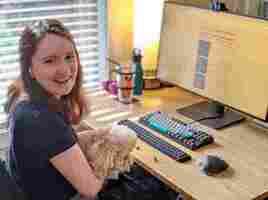I used to be great at my job… then I founded a startup
Usually, I’d hit my groove in a job when I was about 6 months in. At that point, all the little things that had confused me at first started making sense and my performance started to reflect that. But during the whirlwind last 6 months of launching my own startup with another first-timer — I’ve realized I’ll never experience that again.

So herein lies the memoir of a relatively new founder (or flounder?), which will explain why you’ll never be ‘great at your job‘ again after starting your own company.
Sweet safety of being given goals
I used to be great at my job. I solved problems. I got shit done. I did more than what was expected of me. At a relatively young age, I touched down in Europe with what I considered to be my dream job.
My job description was flexible, and as I moved across the continent, I knew what I had to do when I touched down in each of the markets, from Norway to Portugal, the UK to Israel. And I got it done reliably.
Within 6 months of that job, I was getting really good at what I did. People started coming to me to solve their local challenges in a way that made me feel like they only trusted me to fix them. I was the oddball in my team, but I quickly became known as the multi-use jack-of-all-trades (master of only a couple).
I brought with me an entrepreneurial attitude to the work I did in my team. I built quickly, iterated often, constantly questioned focus, strategy, and priority to ensure the best work was being devoted where it needed to be.
I was presented with problems, I solved them, and my superiors were happy.
Needing a bigger challenge
After doing that for a few years, I felt as though I was somehow treading water. Personally, I wasn’t developing at the pace I set for myself, and my projects were getting cycled through the business so quickly that I felt the opportunity to build momentum had completely vanished.
So I bailed. I joined a good friend full-time on a startup. Our first foray into business ownership, tech platforms, software sales, content creation, you name it. It was all new.
We were green… and still are.
Building a business from the ground up meant everything changed. My ‘jack-of-all-trades’ skillsets suddenly accounted for nothing — because I suddenly had to take everything from A to Z on my own.
I anticipated this to a large degree and flooded my bookshelf with the kinds of wisdom I knew I would need. My bookshelf is still totally out of control, but I’m getting through it.
I started building relationships with people who I knew I could learn from. I saw this change in many ways as going back to school. It turned out I was right. But I forgot how brutal school can be.
What makes me a good employee now?
As I got more settled in my new role as founder, I realized the common metrics I was chasing down before didn’t mean shit anymore — especially the ones I used to determine if I was ‘great at my job.’ In the startup world, there is an endless sea of tasks to do, people to talk to, and things to learn. It still overwhelms me frequently.
Without colleagues or superiors, it can be incredibly difficult to know where to focus your attention at times. What makes this particular task more important than the other? Who decides if you’re ‘great’ at your job?
I had to get comfortable with multitasking on a level I didn’t quite know how to handle at first. The biggest challenge has been focusing on a supremely small, extremely important set of tasks, and protecting the time you need to get it done.
This includes the time you need for yourself to eat, sleep, relax, do things you love, and be around the people dear to you. Don’t skimp on this.
So if you’re planning on jumping from a corporate monster into your own startup. Absolutely do it. Or don’t. It’s impossible for anyone to tell you if you’ll love it, hate it, or anything in between.
But if you do make the jump, be prepared to kiss being a good employee goodbye — those days are officially gone.
Instead, you’re finally just… you.
So whether my startup journey turns out to be a raging success or an embarrassing flop that takes me straight into the therapist’s chair, I wouldn’t change this experience for anything.
I’m having fun, I’m challenging myself, I’m finding my feet in a sea of toes that I try not to step on too often. I’m finding more and more ways to do what I’m great at as time goes by. I’m no longer a good employee, but I’m finally me.
How to manage your energy to manage your work
I need three hours of focused time per day to complete — and feel proud of — my week’s work. It’s just how my brain works.

As a coach and facilitator, I’ve become convinced that everyone, regardless of their role, needs uninterrupted work time every day. Engineers need to write code without errors. People managers need to synthesize a day of one-on-one calls. Support and sales roles need to manage their pipeline after a day of context-switching between customers.
When my clients get this dedicated work time, they’re more motivated and focused. But uninterrupted calendar blocks are hard to design into your schedule. We balance meetings, messages, and family members who need our attention. Working for three focused hours per day might sound impossible to do — that means it’s worth trying. Here, I’ll share with you how I practice this skill.
Manage your expectations about what you can accomplish
I’m an introvert. I need time to recharge after working. On meeting-heavy days, I can’t effectively spend evening hours finishing my work. Most of us can’t sustainably do this and maintain our energy.
When I have a heavy meeting day, I can’t productively attend those meetings if I’m thinking about all the work I need to complete later. I need to focus on the meetings, and only the meetings, because these are topics and people I care about.


On these days full of meetings, I only handle urgent requests (instead of important tasks) that I’m capable of doing between meeting breaks.
When I improperly estimate my workload, I reset expectations with folks about what I can accomplish that day.
On lighter meeting days, I knock out my important list. This is when I get longer projects done that require more of my brainpower. I also analyze which tasks took longer than expected or that I need to discuss with stakeholders. This teaches me where I need to improve my time management skills.
Structure your work life to balance energy and goals
Meeting all your goals without burning out is a skill. A few things have helped me and my coaching clients:
Know your internal clock. I honor my chronotype —this tells me how my personal circadian rhythm impacts my energy throughout the day. Morning meetings motivate me to start the day on time, so I schedule those from 9 a – 12 My energy peaks after lunch, so that’s when I block my focused work to leverage my naturally-occurring best self. Evenings are reserved for my family and non-work passion projects. This also matches my work style: I’m a work separator, not an integrator.
Bucket your time. When possible, I proactively bucket my meetings into chunks . For example, my schedulable coaching sessions are in the same three-hour block twice a week. An app called Clockwise helps me maintain this schedule: it arranges my calendar events so I have chunks of focused time to work. This helps me reach a state of flow when managing my to-do list outside of Zoom. Uninterrupted focus time = my most productive time.
Go off the grid. I automatically set Slack to Do Not Disturb outside work hours, and I quit Slack when I do deep focus work.
Rely on peers. If you’re an extroverted remote worker or like social accountability, use a virtual co-working tool like Focusmate. You can also ask your coworkers to hold you accountable without any tools.
Reflect. At the end of each workday, I observe how I spent my time. Then I add events to my calendar to document a map of what I accomplished in each block of time. This helps refine my workload estimation skills and hold myself accountable to the work I said I’d do. You can set this to private in most calendar apps — you know, if you don’t want to share it with your entire organization.
Like anything, these skills are about balance. Priorities can shift in a dynamic workday. My team’s needs matter too. That’s why I prioritize their requests to chat if they need me, and I make myself available in the afternoon a few days per week to accommodate their time zones. The goal is to balance my work commitments, care for my team, and for myself.
Build systems for these skills
These steps require behavior shifts. Most importantly:
Build a habit. Identify what you need to do to make this a reality. Practice those steps daily. Then ask your partner, manager, or a coach to hold you accountable.
Communicate. Share your intention with your team and manager so they know when you’re available and why these steps ultimately help you all meet your goals. Then automatically update your Slack status during focused time.
Assess your work environment. Your teammates have equally important energy management needs. Design your work to meet your role’s expectations and your colleagues’ expectations of you. From there, notice any parts of your work environment that don’t support your energy management. A human-first work environment recognizes we need control over our energy to produce quality work. If you’re in an environment that doesn’t match your needs, or if caregiving commitments prevent you from reserving three hours per day of focused time, identify a realistic end-state for you. Work backward to address what is in your control .
People make organizations successful. You’re a person, too. Treat yourself that way.
This article was originally published on the Zapier blog and is republished here with permission. You can read the original article here .
Never only hire the smartest people
Boris is the wise ol’ CEO of TNW who writes a weekly column on everything about being an entrepreneur in tech — from managing stress to embracing awkwardness. You can get his musings straight to your inbox by signing up for his newsletter!

It isn’t easy to guess how smart you really are. I certainly know people a lot cleverer than me — and I’m regularly dumbfounded by the simplest things. Yet, occasionally I’ll end up doing something ‘pretty smart.’
And this is totally fine.
The older I get, the more I understand (and experience) that intelligence isn’t everything — it’s just a tool. On its own, a tool can’t do much of anything. It isn’t until it’s wielded correctly and used in tandem with other specialized equipment that the real magic happens.
A high-quality camera in the hands of an amateur will probably not produce a better photo than a cheap one in the hand of an artist. Just like how intelligence in the hands of a person who doesn’t know how to use it in a creative way is pretty useless.
I think I’ve gotten a lot of mileage out of the limited amount of intelligence I possess by being stubborn and persistent — and then combining that with creativity and unrestricted thinking.
That’s my full toolset: some intelligence, combined with a lot of creativity and persistence.
There are people who are smarter than me (a lot, actually) but some are just too rigid in their thinking, too entitled to work hard, or not creative enough to come up with even one original thought. They’re damn smart, but that’s all.
Being extremely intelligent will not get you anywhere unless you have the social skills, intuition, and sense of timing to match.
So, how does this knowledge help us? You can use it to put your own talents to good use and discover skills in others. You can be a complementary tool in your team’s collective toolbox (sorry for calling you a tool).
Pure creativity without a sense of marketing and commerce isn’t going to get you very far. And the smartest person in your class isn’t the one most likely to succeed — but they might know the best way to implement your creative solution.
Companies should never ‘only hire the smartest people,’ because intelligence on its own can be pretty dumb.
Can’t get enough of Boris? Check out his older stories here , and sign up for his newsletter here .